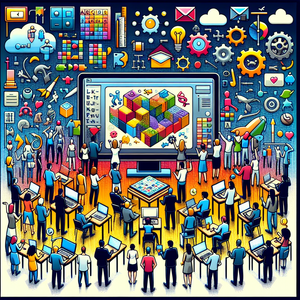The Psychology Behind Wordle: Why We Love Puzzles

At the core of Wordle's appeal lies the thrill of challenge. Humans are naturally inclined to seek out puzzles and problems to solve. This instinct dates back to our evolutionary roots, where survival often depended on our ability to think critically and solve complex problems. In the context of Wordle, players are presented with a limited number of guesses to identify a five-letter word, tapping into this primal urge for cognitive challenge. Research in psychology suggests that completing a challenge triggers the release of dopamine, a neurotransmitter associated with pleasure and reward. Each time a player successfully guesses a letter or solves the puzzle, they experience a small surge of satisfaction, reinforcing the behavior and encouraging them to return for another round. This cycle of challenge, reward, and motivation is a powerful driver of engagement. For instance, players might feel exhilarated after successfully guessing a tricky word like "quirk," leading to a sense of accomplishment that keeps them eager for the next day's challenge.
The Satisfaction of Mastery
Another key factor in Wordle's popularity is the sense of mastery it provides. As players invest time and effort into the game, they begin to develop strategies and skills that enhance their performance. This progression from novice to expert fosters a sense of competence, leading to increased self-esteem and enjoyment. For example, many players learn to recognize common letter patterns and employ strategies such as vowel-heavy guesses to maximize their chances of success. This not only makes the game more enjoyable but also instills a sense of achievement as players refine their techniques. The feeling of mastery is especially pronounced when players share their results on social media, showcasing their skills and celebrating their victories with friends and family. When someone posts their successful guess in just three attempts, it not only reinforces their mastery but also invites others to challenge themselves.
The Social Aspect of Sharing
Wordle's design includes a compelling social dimension that further enhances its appeal. Players are encouraged to share their results on social media platforms, often in the form of colorful grids that display their guessing patterns without revealing the actual word. This aspect of the game fosters a sense of community among players, as they bond over shared experiences and friendly competition. Psychologically, social connections are vital for our well-being. Sharing accomplishments and engaging in friendly rivalry can boost mood and increase motivation. The communal aspect of Wordle encourages players to discuss strategies, celebrate successes, and even commiserate over challenging puzzles. Whether it’s sharing a triumphant win or a particularly tough day, the collective experience not only strengthens social bonds but also deepens the enjoyment of the game itself. This social sharing aspect transforms a solitary activity into a communal event, making it more engaging and rewarding.
The Comfort of Routine
In a world filled with uncertainty, Wordle provides a daily routine that many players find comforting. The simplicity of the game—one puzzle per day—creates a predictable structure that allows players to carve out a small moment of joy in their day. This routine can be particularly appealing during stressful times, offering a brief escape and a sense of control. Psychologically, routines can provide comfort and stability, helping to reduce anxiety. Engaging in a daily Wordle puzzle allows players to focus their minds and engage in a productive activity, making it an ideal pastime for those seeking solace from the chaos of everyday life. For instance, many players have reported that their daily Wordle session serves as a morning ritual, a calming moment that sets a positive tone for the rest of the day.
Wordle's captivating nature can be attributed to a combination of psychological factors that resonate deeply with players. From the thrill of challenge and the satisfaction of mastery to the social connections fostered through sharing results and the comfort of routine, Wordle taps into fundamental aspects of human psychology. As players continue to engage with this simple yet addictive puzzle, it is clear that Wordle has become more than just a game; it has become a daily ritual that enriches our lives in various ways. Whether you’re a seasoned player or a curious beginner, understanding the psychology behind Wordle can enhance your appreciation for this beloved word game. The next time you log in to solve the puzzle of the day, consider the psychological mechanisms at play that make this experience so universally enjoyable.
User Experience (UX) Researcher
Zynga, Electronic Arts
Job Description
Conduct user interviews and usability testing to gather insights on player behavior and preferences.
Analyze data to inform design decisions and improve user engagement, particularly for puzzle-based games like Wordle.
Strong skills in qualitative and quantitative research methods, as well as experience with tools like UserTesting or Optimal Workshop.
Game Designer (Puzzle Games)
Rovio, King
Job Description
Develop engaging puzzles and gameplay mechanics that enhance user interaction and satisfaction.
Collaborate with artists and developers to create a cohesive game experience, focusing on user feedback and playtesting results.
Proficiency in game design software (e.g., Unity, Unreal Engine) and an understanding of player psychology are essential.
Data Analyst in Gaming
Activision Blizzard, Ubisoft
Job Description
Analyze player data to identify trends, retention rates, and engagement levels, providing actionable insights for game improvements.
Utilize statistical software (like R or Python) to create reports and dashboards that track user behavior over time.
Experience with A/B testing to measure the impact of game updates and features is highly valuable.
Community Manager for Gaming Platforms
Discord, Twitch
Job Description
Foster and manage online communities, engaging with players to build relationships and gather feedback on game features.
Create content for social media that encourages sharing and community interaction, particularly around games like Wordle.
Strong communication skills and experience with social media management tools (like Hootsuite) are crucial for success.
Behavioral Scientist (Game Development)
Riot Games, Epic Games
Job Description
Research and apply psychological principles to enhance player engagement and satisfaction in gaming experiences.
Collaborate with game designers to create mechanics that tap into cognitive biases and user motivation.
A background in psychology, particularly with a focus on behavioral economics or game theory, is essential for this role.


